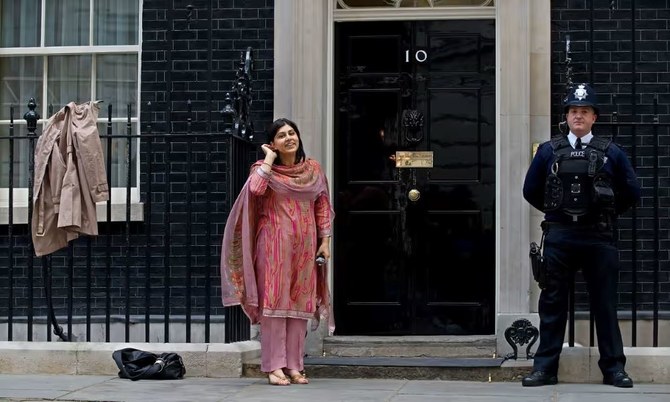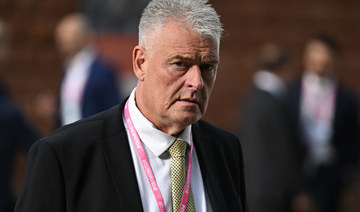LONDON: Britain’s governing Conservative Party has once again found itself embroiled in accusations of Islamophobia following the remarks of its former Deputy Chair Lee Anderson.
Speaking on GB News last week, he claimed that London Mayor Sadiq Khan, one of the UK’s highest-profile Muslim politicians, had “given away control of the capital to his mates,” describing him as under the control of Islamists.
Party bosses purportedly pushed Anderson to apologize in an effort to mitigate the fallout, but failed. He has since doubled down, claiming he has public support.
A day after the comments were made, a party spokesperson confirmed that while remaining an MP, Anderson would no longer serve his Ashfield constituents as a Conservative but rather as an independent, in what is expected to be a highly contentious election year.
If the hopes were that a relatively swift, if not immediate, ousting from the party would calm the situation, such hopes have proved misplaced.
Many are pointing not to the event but its handling as indicative of structural Islamophobia within the Conservative Party, with commentators noting that the suspension came not for the comments themselves but for defying party requests that he apologize.
One of the Conservatives’ own leading figures, Baroness Sayeeda Warsi — the first Muslim to serve in the British Cabinet — told LBC Radio: “It’s definitely not a party I recognize, but it’s not a party that so many of my colleagues recognize.
“I’ve had colleagues on the phone … just despairing. I’ve had very senior ex-cabinet colleagues saying, ‘they’re just jokers.’
“What disturbs me more is that this kind of divisive far-right conspiratorial rhetoric is now in the mainstream, and this has real-life consequences.”
Polling by Opinium of 521 Conservative Party members indicated that 58 percent consider Islam a threat to the British way of life, with 52 percent believing an ever more prominent conspiracy theory that pockets of Europe are under Shariah law and “no-go” areas for non-Muslims.
For some, the figures explain Prime Minister Rishi Sunak’s repeated refusal to describe Anderson’s comments as Islamophobic, instead describing them as “unacceptable” and “wrong,” while denying claims that the party has Islamophobic tendencies.
Responding to Sunak, Khan told Sky News that he had been left “bewildered” by the party’s refusal to “call this (Islamophobia) out.”
“They should say what the problem is. The problem is that you have a senior Conservative saying things that are clearly racist, anti-Muslim and Islamophobic — this is leading to an environment where anti-Muslim crime is spiraling,” Khan said.
“What they’re doing is pouring petrol on the flames of Islamophobia. You wouldn’t put up with antisemitic tropes. Racism is racism.”
Scotland’s First Minister Humza Yousaf made the point more explicitly, telling STV News that the Conservative Party has a “structural” issue with Islamophobia, and that Anderson’s comments and the response are “just a further demonstration that Islamophobia is normalized.”
The evidence is not hard to find, with another furore having broken out last year when Khan’s Conservative opponent in the summer mayoral election, Susan Hall, whose candidacy has been mired in controversy, said Jewish Londoners were afraid of him and endorsed a tweet describing him as the “mayor of Londonistan.”
These are not the highest-profile Conservatives to have peddled Islamophobic rhetoric in recent years, nor is Anderson the first to have targeted Khan.
The mayor’s 2016 opponent Zac Goldsmith had to launch an investigation into his own team after claims of Islamophobic comments, with subsequent suggestions that he had been running a racist campaign in an endeavor to beat Khan.
Then-Prime Minister Boris Johnson’s subsequent appointment of Goldsmith to the House of Lords only added fuel to the fire. Johnson himself said women in burkas look like letterboxes.
Former Home Secretary Suella Braverman earlier this month claimed that the UK is losing its identity and capacity to peacefully coexist with different faiths and races because Islamists are taking over.
Writing in the Daily Telegraph, she said of Islamists: “We see their influence in our judiciary, our legal profession, and our universities.”
She added that they are next coming “for Parliament,” in a diatribe all too familiar with that seen across a range of far-right electoral strategies.
Britain’s largest Muslim body, the Muslim Council of Britain, has written to Conservative Party Chair Richard Holden demanding an investigation.
“Our view is that Islamophobia in the party is institutional, tolerated by the leadership and seen as acceptable by great swathes of the party membership. Leaders can shape the agenda and narrative and play a role in Islamophobic hate crime,” the letter stated.
“Islamophobic hate crime has trebled according to Tell Mama. These issues cannot — and must not — be ignored.”
Business Minister Nus Ghani, senior backbencher Sajid Javid and Conservative peer Gavin Barwell also condemned Anderson’s comments, but Warsi remains one of the few to have pointed out the wider issues in her party.
And it is a drum she has been beating for more than a decade, having noted in 2011 that around Conservatives, Islamophobia had “passed the dinner-table test.”
























